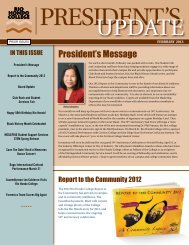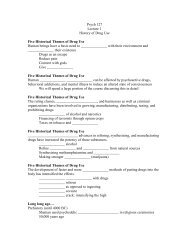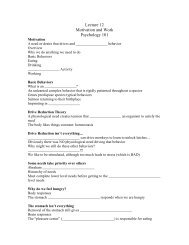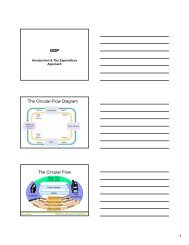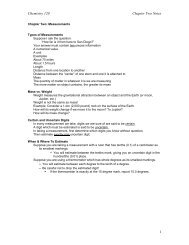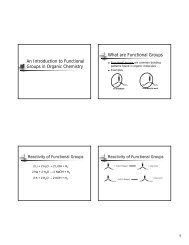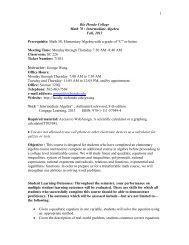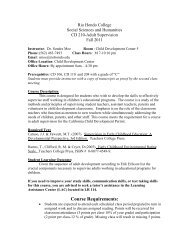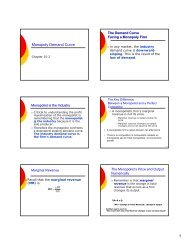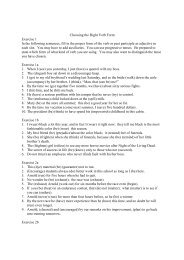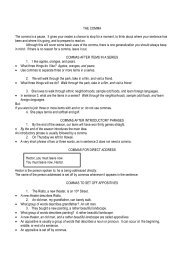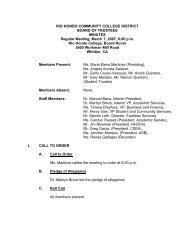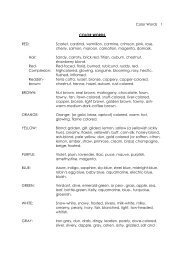Complete College Catalog 2011-2012 - Rio Hondo College
Complete College Catalog 2011-2012 - Rio Hondo College
Complete College Catalog 2011-2012 - Rio Hondo College
You also want an ePaper? Increase the reach of your titles
YUMPU automatically turns print PDFs into web optimized ePapers that Google loves.
Various social theories and relevant<br />
empirical research are critically<br />
analyzed from both a Western and<br />
non-Western perspective.<br />
3 Units<br />
54 Lecture hours<br />
SOC 114<br />
Marriage, Family and Intimate<br />
Relationships<br />
Advisory: ENGL 035 or ESL 198 or<br />
appropriate assessment; READ 023 or<br />
appropriate assessment<br />
Transfers to: UC, CSU<br />
This course is designed for the<br />
student interested in examining,<br />
from a sociological perspective,<br />
issues such as marriage, family, and<br />
emerging alternative life styles which<br />
constitute the reality of life today. The<br />
course explores love, sexuality, mate<br />
selection, and engagement preceding<br />
traditional marriage and family<br />
patterns, extra-marital and non-marital<br />
unions, singles, and future trends in<br />
intimate relationship styles.<br />
3 Units<br />
54 Lecture hours<br />
SOC 116<br />
Introduction to Race and Ethnic<br />
Relations<br />
Advisory: ENGL 035 or appropriate<br />
assessment; READ 023 or appropriate<br />
assessment<br />
Transfers to: UC, CSU<br />
This course presents an overview of<br />
the structure and character of racial<br />
and ethnic relations in the United<br />
States. Students will gain knowledge<br />
of the treatment and experiences of a<br />
variety of racial and ethnic cohorts and<br />
gain insight into the complex social<br />
features of inter-group contact.<br />
3 Units<br />
54 Lecture hours<br />
SOC 118<br />
Aging: Introduction to Social<br />
Gerontology<br />
Advisory: ENGL 030 or ESL 197 or<br />
appropriate assessment, READ 022 or<br />
appropriate assessment<br />
Transfers to: UC, CSU<br />
This course is designed as an<br />
introduction to social gerontology,<br />
the study of the social aspects of<br />
aging. Emphasis is placed on family<br />
life, health and health care, social<br />
support, the politics of age, retirement,<br />
widowhood, care of the frail elderly,<br />
and dying, death, and bereavement.<br />
It targets students interested in aging<br />
for both personal and career-related<br />
reasons. The course defines the field<br />
and focuses on interdisciplinary<br />
perspectives on aging, cross-cultural<br />
issues, changes in social roles and<br />
relationships, social aspects of<br />
individual aging, the economics<br />
and politics of aging, and aging and<br />
inequality.<br />
3 Units<br />
54 Lecture hours<br />
SOC 120<br />
Perspectives of Sex & Gender<br />
Advisory: ENGL 035 or ESL 198 or<br />
appropriate assessment; READ 023 or<br />
appropriate assessment<br />
Transfers to: UC, CSU<br />
In this course we will explore how<br />
gender shapes our lives and the<br />
world around us. Using a sociological<br />
perspective, we will examine gender<br />
as a social construction rather than a<br />
simple biological difference. Topics<br />
to be covered will include, but not<br />
encompass, cultural ideas of gender,<br />
gender and the economy, politics, the<br />
media, families, and education. This<br />
course is designed for men and women<br />
who want to learn more about the<br />
social connections of gender and how<br />
the importance of gender differences<br />
are strengthened in our society today.<br />
3 Units<br />
54 Lecture hours<br />
SOC 127<br />
Introduction to Criminology<br />
Advisory: ENGL 030 or ESL 197 or<br />
appropriate assessment; READ 022 or<br />
appropriate assessment<br />
Transfers to: UC, CSU<br />
This course presents a scientific<br />
analysis of the nature, extent, and<br />
causes of violations of societal<br />
rules of behavior that are formally<br />
defined as crime and delinquency.<br />
The course includes an analysis of<br />
the development of criminal law<br />
and the administration of criminal<br />
justice, the patterns of criminality<br />
and delinquency, the impact of crime<br />
on social change, and the labeling,<br />
identification, characteristics,<br />
and treatment of criminals and<br />
delinquents.<br />
3 Units<br />
54 Lecture hours<br />
SOC 148<br />
La Chicana: The Contemporary<br />
Mexican-American Female (Same as<br />
CHST 148)<br />
Advisory: ENGL 035 or ESL 198 or<br />
appropriate assessment; READ 023 or<br />
appropriate assessment<br />
Transfers to: UC, CSU<br />
The introductory course will examine<br />
the ethnic identity formation of the<br />
Mexican-American woman. The<br />
students will analyze the employment,<br />
education, religious, family, historical<br />
and cultural influences present<br />
in the lives of Mexican-American<br />
females. This course is appropriate<br />
for students interested in furthering<br />
their understanding of the social<br />
construction of the Mexican-American<br />
woman.<br />
3 Units<br />
54 Lecture hours<br />
SOC 299<br />
Directed Study: Sociology<br />
Transfers to: UC, CSU<br />
The course is intended for students<br />
who have the ability to assume<br />
responsibility for independent work<br />
and to prepare written or oral reports<br />
and/or appropriate projects; who<br />
possess a 2.5 overall grade point<br />
average and/or a 3.0 grade point<br />
average in a major, or for whom the<br />
instructor feels an exception should<br />
be made. Directed Studies may be<br />
developed from any topic arising<br />
from or related to a course of study<br />
that will result in developing depth<br />
and breadth in that subject area.<br />
The project title will vary with each<br />
individual project. Students will be<br />
expected to meet on a regular basis<br />
with their faculty sponsor and submit<br />
a final report or project. One unit of<br />
credit will be awarded for 48 hours<br />
of directed studies, 6 hours of which<br />
must be with an instructor. A student<br />
may take this course for a maximum<br />
of 4 units within a discipline, but may<br />
not accumulate more than a total of 12<br />
units college wide.<br />
1 to 3 Units<br />
48 to 144 Hours<br />
____________________<br />
SPANISH<br />
Division of Communications &<br />
Languages<br />
SPAN 101<br />
Spanish I<br />
Advisory: ENGL 030 or ESL 197 or<br />
appropriate assessment; READ 022 or<br />
appropriate assessment<br />
Transfers to: UC (credit limit*), CSU<br />
(*Students will receive credit from UC<br />
for only one of the following sequences<br />
of courses: SPAN 101 and SPAN 102 or<br />
SPAN 130 and SPAN 131)<br />
This course is an introduction to<br />
the essentials of Spanish language:<br />
reading, listening, speaking, and<br />
writing skills. Various facets of<br />
Spanish-speaking cultures will<br />
be analyzed via cross-cultural<br />
comparisons. In addition to classroom<br />
discussion, students receive intensive<br />
individualized oral-aural practice in<br />
the language laboratory via interactive<br />
websites, audio CDs, video programs,<br />
and CD ROMs. This class is designed<br />
for those students who do not have a<br />
Spanish language background who<br />
wish to learn to speak Spanish or who<br />
seek a degree in the Spanish language.<br />
4 Units<br />
72 Lecture hours<br />
18 Lab hours<br />
SPAN 102<br />
Spanish II<br />
Prerequisite: Successful completion of<br />
SPAN 101 or two years of high school<br />
Spanish<br />
Transfers to: UC (credit limit*), CSU<br />
(*Students will receive credit from UC<br />
for only one of the following sequences<br />
of courses: SPAN 101 and SPAN 102 or<br />
SPAN 130 and SPAN 131)<br />
This course is a continuation of the<br />
study of the essentials of Spanish<br />
language: reading, listening,<br />
speaking, and writing skills. Various<br />
facets of Spanish-speaking cultures<br />
will be analyzed via cross-cultural<br />
comparisons. In addition to classroom<br />
discussion, students receive intensive<br />
individualized oral-aural practice in<br />
the language laboratory via interactive<br />
<strong>2011</strong>-<strong>2012</strong> <strong>Catalog</strong> <strong>Rio</strong> <strong>Hondo</strong> <strong>College</strong> / 245



